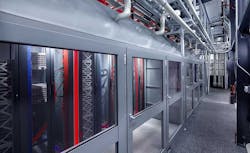Switch Teams With FedEx, Dell to Deploy Edge Data Centers
In a venture that brings together data and logistics, Switch is teaming with FedEx and Dell Technologies to create an edge computing network for enterprise customers, the companies said today.
The first deployment will be in Memphis, and feature Switch Edge modular data centers deployed on FedEx real estate, with Dell providing server hardware and managed services.
The companies say they plan to build technology hubs across the United States that will support multiple cloud environments in strategic, secure FedEx locations. FedEx will provide the real estate and a portion of the construction and infrastructure costs, as well as providing technical expertise for new product offerings. The edge deployments will provide low-latency access to high-density compute from FedEx locations, helping power digital innovations in the company’s global supply chain.
“As the size and scale of our network continue to increase, we see more data processing moving to the edge to support the automation and technology required to move more than 16 million packages each day,” said Rob Carter, executive vice president and chief information officer, FedEx Corporation and president and co-CEO, FedEx Services. “The access to multi-cloud edge compute provided by this collaboration with Dell and Switch will allow us to continue reimagining what is possible from our unique position at the intersection of physical and digital worlds.”
The announcement is the latest in a series of partnerships to enable the deployment of edge data center networks. In addition to serving as a marquee enterprise anchor tenant, FedEx has global real estate holdings that can enable Switch to extend its colocation operations wherever it finds demand.
“The nice thing about FedEx is that they are literally everywhere,” said Adam Kramer, Executive Vice President of Strategy for Switch.
The deal also highlights the growing intersection of logistics and digital infrastructure, which are both more important than ever in supporting global business through the COVID-19 pandemic.
A Resilient Approach to Edge Design
Edge computing extends data processing and storage closer to the growing universe of devices and sensors at the edge of the network. Edge computing could have a transformational impact on global society and business, enabling new technologies and services across low-latency wireless connectivity.
The partnership represents the first commercial deployment of the Switch Edge Mod 15 data center, which can deploy IT capacity in blocks from 250 kW to slightly more than 1 megawatt, housing 24 to 1200 cabinets of gear. The design builds on the modular approach seen in Switch’s deployments of new capacity at its four Prime campuses around the United States.
“Teaming up with FedEx and Dell allows the three of us to create and demonstrate how enterprise customers can maintain independent control of their technology futures in the age of hybrid multi-cloud,” said Rob Roy, CEO and founder, Switch. “Offering enterprise-class data centers from the Primes to the Prem, paired with Dell Technologies’ products and services suite and FedEx’s world-class physical infrastructure footprint, creates the technology platform that tomorrow’s businesses will need.”
That enterprise focus is clear in Switch’s engineering of its modular data center, which features a fault-tolerant “system + system” design and service level agreement for 100 percent uptime. The MOD 15 is 15 feet wide and up to 100 feet long, offering a “building-in-building” design with several layers of access control.
“We’re running these the same way we run our Prime data centers,” said Kramer. “We view the edge as something that needs 100 percent uptime and needs to be secure.”
Nearly all of the emerging players in edge computing provide emergency backup power, but typically with less robust power redundancy than Switch is building into its edge modules. That reflects Switch’s focus on enterprise customers. The company works with plenty of carriers and content companies, who have been some of the early adopters of edge infrastructure. But Switch believe its edge locations will fill a gap in how large companies architect their IT infrastructure.
“We really see this as the future of enterprise workloads, with a presence in a Prime, Edge and on-premises facilities,” said Kramer. “That’s why the 100 percent uptime really matters.”
An Air-Transportable Edge Data Center
Switch has been using its factory-built MOD (Modular Optimized Design) units to deploy millions of square feet of data center space on massive campuses in Las Vegas, Reno and Grand Rapids, Michigan. The MOD approach uses a template and pre-fabricated components to create a “build once, run anywhere” design integrating Switch’s custom power, cooling and building systems.
The edge sites will be implemented as stand-alone buildings on FedEx properties, but other customers will be able to access their equipment, as in any other colocation facility. These will be multi-tenant facilities, housing Switch tenants (including FedEx), with Dell serving as the preferred managed services provider, delivering cloud solutions and support services.
“The increasing pace of business is creating a growing reliance on near real-time connectivity to data that resides on the edge,” said John Roese, global chief technology officer, Dell Technologies. “In working with FedEx and Switch, we can create a more local cloud-based environment, offering customers faster access to their workloads and data for greater flexibility and speed.”
The companies said the first facility at a FedEx property in Memphis is “underway.” Switch would not project how many additional sites the partners are contemplating for their network, but said they are poised to respond quickly to demand.
An intriguing wrinkle is that Switch says the MOD 15 is “air-transportable,” with its components sized so the entire system can be loaded onto a plane. FedEx operates the world’s largest cargo airline, with a fleet of 679 aircraft and FedEx Air Express hubs at major markets across the globe. This creates the potential for FedEx to rapidly deploy modules by air, rather than the flatbed trucks and ships that have been used to transport most non-military data center enclosures.
Another element of Switch’s edge strategy is the Switch Sentry security robot, which it says plans to deploy at future edge data centers and will also sell to enterprise customers.
The wheeled Switch Sentry units are nearly six feet tall, and designed to provide security for mission-critical facilities. Switch says each Sentry is autonomous, with the ability to navigate on its own or be steered by a human. Each robot can be equipped with motion detection sensors, night vision and LIDAR (laser light detection sensors) and use 3D mapping to navigate its environment. On-board security features include facial recognition, temperature detection for fevers, and a bullet-resistant exterior for active shooter scenarios.
About the Author


